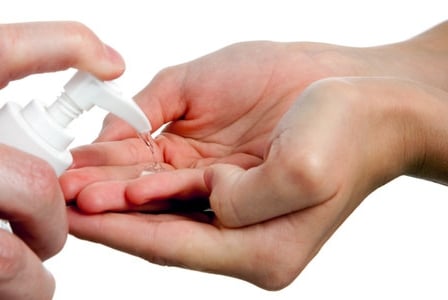
A new Johns Hopkins study has found a link between antibacterials and preservatives found in personal care products and increased risk of allergies in children.
The advertising industry has done a masterful job at selling us on the need to protect ourselves from “harmful bacteria.” Such a good job, in fact, that we may be wiping away the very things that may protect our kids—the common microbes that help build healthy immune responses.
Antibacterial soaps and other products that destroy these helpful pathogens may be linked to the rising rate of food and environmental allergies.
Increased childhood allergies
Researchers at the Johns Hopkins Children’s Center have found a link between some antibacterials and preservatives found in many products such as soap, toothpaste, and mouthwash and an increased risk of allergies in children.
Personal care products implicated
Their study, just published in the Journal of Allergy and Clinical Immunology, measured the levels of certain antibacterials and preservatives commonly used in personal care products in the urine of children aged six to 18 who were part of a US national health survey.
They also measured the level of IgE antibodies to certain allergens in the children’s blood. These antibodies, part of the body’s immune system, rise in response to an allergen and are elevated in people with allergies.
Triclosan and parabens only
The researchers focused on several ingredients that have been shown in lab and animal studies to disrupt endocrine function. The only ones found in their study to have an increased allergy risk were triclosan (an antibacterial and antifungal agent used in soaps, mouthwash, and toothpaste) and propyl paraben (an antimicrobial chemical and preservative used in cosmetics, food, and medications).
Triclosan implicated in food and environmental allergies
The children who had the highest levels of triclosan in their urine had the highest levels of food IgE antibodies, therefore the highest allergy risk, compared with children with the lowest levels of triclosan levels. They also had nearly twice the risk of environmental allergies.
Propyl paraben implicated in environmental allergies
Children in the study who had the highest levels of propyl paraben had more than twice the risk of environmental allergies as those with the lowest levels of the chemical. But these levels were not associated with food allergy risk.
More study needed to find exact cause
Though a link was found in this study, the researchers point out that the antimicrobial chemicals themselves don’t cause allergies, but they may play a role in immune system development.
“The link between allergy risk and antimicrobial exposure suggests that these agents may disrupt the delicate balance between beneficial and bad bacteria in the body and lead to immune system dysregulation, which in turn raises the risk of allergies,” said lead investigator Jessica Savage, MD, MHS, an allergy and immunology fellow at Hopkins.
Regular soap works wonders
We know that keeping clean is important, but the age-old method of washing with soap and warm water is still the best method. Here are proper handwashing guidelines from Health Canada:
- Wet your hands with warm water.
- Add regular soap and rub your hands together, ensuring you have lathered all surfaces, for at least 30 seconds.
- Wash the front and back of hands, as well as between fingers and under nails.
- Rinse hands well under warm running water, using a rubbing motion.
- Wipe and dry hands gently with a clean towel.
- Turn tap off with paper towel.


